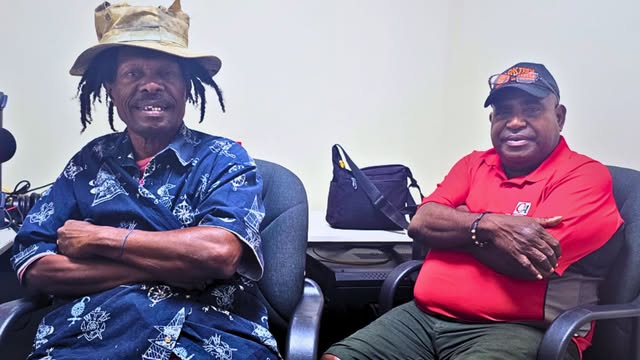As Papua New Guinea prepares to celebrate its 50th Independence Anniversary, two of the country’s iconic music figures, Gedix Atege and Demas Saul (known as Demas Soul), are shifting gears from romance to reality by using their platform to speak out on the issues plaguing their homeland.
In an exclusive interview with PNG HAUSBUNG, the duo revealed they are working on a new project that addresses law and order challenges, the lack of services to remote parts of the country, and other major issues, particularly in their beloved Madang province.
“Yes! We are currently planning a project which is not a love song, but one directed back to our beautiful Madang and all the issues we face,” said Demas Saul.
He added that the project initially faced challenges.
“We had recorded it, but the outcome didn’t meet expectations, so we went back and did it all over again.”
When asked whether a song dedicated to the country’s 50th Independence Anniversary was in the works, Demas responded, “Well, I’ve been telling Gedix to stop writing love songs and let’s start writing about the situations our country is facing right now.”
While still on the subject of the country’s 50th Independence Anniversary, Gedix offered a more critical perspective.
“We talk about independence, but why did we actually get it? Does it mean everyone is living a good life? That’s what I’ve been thinking.”
“After every independence celebration, most people return to their hard lives, sweating for just one meal, while the ones we call leaders eat good food, drink expensive drinks, and sleep in fancy hotels. So, my question is: why are we celebrating if we’re just going back to struggle?”
The pair also highlighted the stark contrast in infrastructure between provinces.
“When me and Demas went to perform in Rabaul, there were roads even into remote villages, which is not the case in our remote areas in Madang,” Gedix noted.
Demas added, “It all goes back to our leaders.”
Gedix also reflected on parliamentary behavior and pointed out that meaningful discussions are often mocked or silenced.
“When there’s a parliamentary sitting and an MP brings up a valuable topic, others just laugh or shut them down. That’s what we’re all doing—we are shutting down those who speak up for what’s right.”
Demas, who previously considered contesting in his LLG in Madang, revealed he had to step back due to the demands of music.
“I wanted to contest, but I knew it would take a lot from me, so I told my people, maybe next time.” Laughing, he added, “When we go back, Gedix will endorse me!”
The interview shed light on a broader truth. Music in Papua New Guinea is evolving. It is no longer just a medium for love songs; it is becoming a voice for change.
Gedix admittedly said that writing love songs is much easier for him because that’s what he has done for years. But writing about the issues we are facing is much more difficult.
“It takes a lot to make it meaningful because it must carry a message of hope, awareness, and purpose.”
When asked about the current state and future of music in the country, Demas shared his observations.
“Today, most singers sound the same. Many are starting to sound like Tarvin Toune, whose music is great. But one artist who stands out is Ragga Siai. His smash hit ‘Maria’ has a different feel and is very impressive.”
Demas then called for unity in the music industry.
“I think we older artists need to collaborate with younger ones so we can help each other reach global audiences.”

